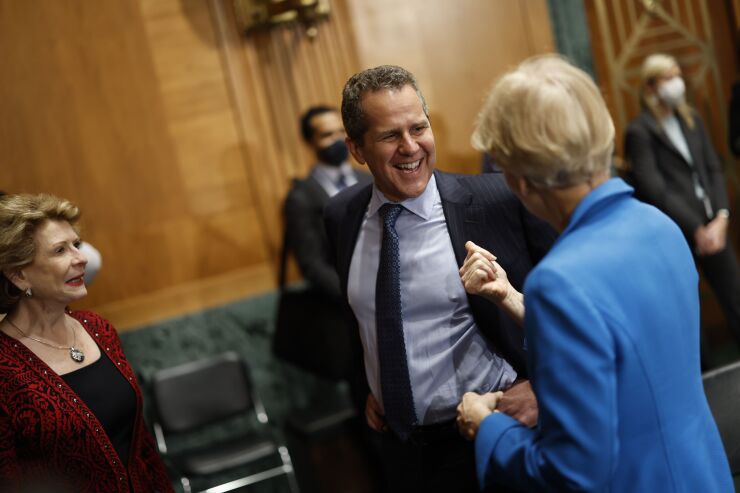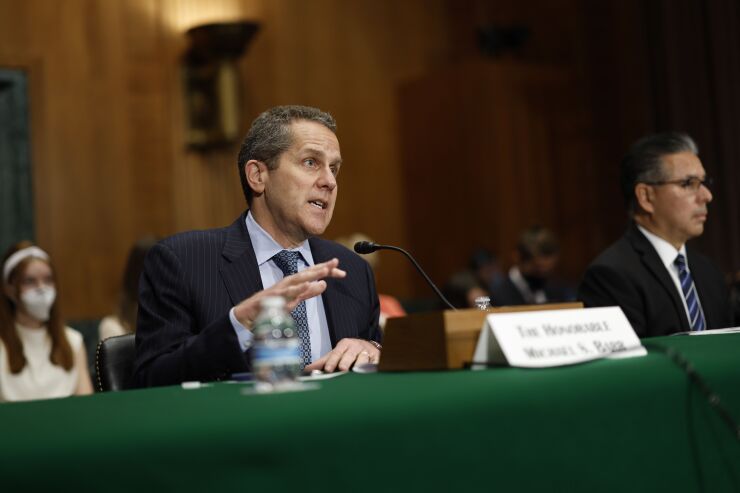Changes are coming to the Federal Reserve's regulatory and supervision policy, just not the type of sweeping reform some had advocated and others had feared.
Last week, Michael Barr gave his first speech since being sworn in as the Fed's new vice chair for supervision in July. He outlined a different set of priorities from his predecessor, Randal Quarles, but did not deliver the full- scale rebuke called for by certain progressive groups at the onset of the Biden administration.
"I would have liked more specificity on these things, like outlining Trump-era guidelines and what exactly he wants to change," said Renita Marcellin, senior policy analyst at Americans for Financial Reform. "But he laid out all the things we can expect to see in the fall. … We're cautiously optimistic, but optimistic nonetheless, on where things are headed. But yes, at some point, the devil is in the details, and we want to see the details."

The
In his remarks, some policy experts saw Barr potentially laying the groundwork for increasing capital requirements. During a question-and-answer session after the speech, he said he would not commit to making the final implementation of the Basel III international regulatory standards capital neutral, contradicting a stance espoused by Fed officials as recently as last year.
Barr also said he would oversee a "holistic" review of the Fed's various capital requirements this fall. During that effort, Barr said he would evaluate whether the country's largest banks were sufficiently capitalized.
"What we're doing is this fall taking a look at where we are with capital in the system so that as we make judgments about Basel III, the supplementary leverage ratio, countercyclical capital buffer, it's with an overall sense of is capital in the system strong enough," he said. "It's strong; I think the question is, is it strong enough?"
Left-leaning policy advocates say the question of whether there is sufficient capital in the system is one that went unasked under Quarles, who was appointed vice chair for supervision by then-President Donald Trump.
Todd Phillips, director of financial regulation and corporate governance at the Center for American Progress, said he was encouraged that Barr mentioned the supplementary leverage ratio — which determines how much reserve capital a bank must hold against riskier assets — and the countercyclical capital buffer — a regulatory tool that increases bank capital requirements during periods of economic expansion to build reserves ahead of the next downturn.
"The fact that he came in here wanting to think about these issues and mentioned them explicitly in his speech is a change from the Trump era regulators for sure," Phillips said.
Others worry Barr's views on capital rules could ultimately create more problems than they solve. Stephen Miller, a senior research fellow at the libertarian-leaning Mercatus Center, said Barr's goal to have a "forward-looking" regulatory system, one that changes in tandem with market and macroeconomic risks, is too ambitious.
"Capital is forward-looking because the investors know they have their wealth at stake. Regulation is, at best, adapting to changes in the marketplace, so they are actually always behind," Miller said. "It's wishful thinking if" a predictive regulatory regime "is the aim."
Miller also took issue with Barr's goal of taking a closer look at large banks that do not meet the criteria of being global systemically important banks but still could have broader economic impacts if they fail. Barr said he would work with other bank regulators to devise policies to make sure the resolvability plans for these banks are adequately supervised.
"They want to target anything, it seems, between community banks and the top 10 banks that are subject to the most stringent Basel standards," Miller said. "You're really just going to probably be driving banks to be more like the top 10."

Barr noted that tailoring capital requirements to match specific size and scope of individual banks would be a key component of his holistic approach.
"As firms increase in systemic importance, the social cost of their failure grows," Barr said during his speech. "Regulations should be designed to require firms to internalize the costs that their potential failure would impose on the broader financial system and thus on businesses and households. This means that firms face higher costs through more stringent regulations as they grow in complexity, size and interconnectedness. And rightly, that community banks face simpler regulations."
Karen Petrou, co-founder and managing partner of Federal Financial Analytics, said she was encouraged by the additional detail Barr provided about his vision for a holistic capital review. He mentioned the concept briefly during his confirmation hearing in front of the Senate Banking Committee earlier this summer.
Petrou said last week's remarks demonstrated Barr's initial statement was not an "idle promise." She added that having capital rules that reflect individual bank's risk exposures would be key to enhancing both safety in the financial system and fairness, one of Barr's chief objectives.
"It was not just about having more capital, but asking the question of what is that for and what is it actually doing," Petrou said. "The holistic part is recognizing that a bigger number does not necessarily mean better capital."
During his debut policy speech in 2018, three months into the job, Quarles also called for a holistic accounting of existing Fed policies. His comprehensive review, however, focused on identifying ways to make regulations simpler, more efficient and more transparent.
"At this point, we have completed the bulk of the work of post-crisis regulation," Quarles said at the time. "As such, now is an eminently natural and expected time to step back and assess those efforts. It is our responsibility to ensure that they are working as intended and — given the breadth and complexity of this new body of regulation — it is inevitable that we will be able to improve them, especially with the benefit of experience and hindsight."
Quarles's legacy from his time in office largely reflects those priorities. Aided by the Economic Growth, Regulatory Relief, and Consumer Protection Act, which amended components of Dodd-Frank, Quarles oversaw significant changes to how stress tests were conducted, including which banks were subject to them and how frequently, and transparency around the examination process. These efforts, which broadly aligned with the Trump administration's deregulatory agenda, were widely supported by banks and bank advocates.
With the Biden administration entering the White House championing a reinvigorated regulatory system focused on economic equality, some advocacy groups are hoping Barr adopts a more aggressive approach to stress testing, or at least reverts to the pre-Quarles policy. Marcellin at Americans for Financial Reform said she would like to see the qualitative evaluations reintroduced to the testing criteria and a broader array of scenarios, ones that include cybersecurity threats and matters of racial equity.
"The whole thing needs to be revitalized," she said. "We want to see it move from this, going-through-the-routine-and-motions exercise, as it has become in the last few years, to something with real consequences and enhanced capital requirements if banks do not meet the standards they should for the test."
Barr, who helped implement Dodd-Frank as assistant secretary of the Treasury under then-president Barack Obama, said little about stress tests during his prepared remarks, other than to say they would be part of holistic review. During the question and answer session, he supported a robust testing regime.
"I want to make sure that the stress tests stay stressful," he said. "They're supposed to be stressful, they're supposed to be tough and I want to make sure they are that way."





